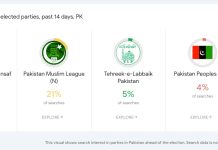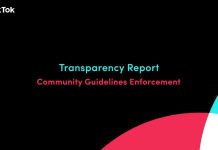Amid lockdowns during the Covid-19 crisis, tech giant Google has launched various features and incentives to ease load on telecommunication providers and to support remote learning and access to correct information in Pakistan.
According to a Pakistan Telecommunication Authority (PTA) announcement issued on Wednesday, Google introduced new features and resources for users in Pakistan to assist them stay informed and connected, support small businesses and to contain the spread of misinformation on its platforms.
Last week the PTA had observed the web usage within the country had increased by 15 per cent following varying lockdowns across Pakistan. the rise , it said, was observed thanks to a spike in online activities by educational institutions and businesses also as a ‘work-from-home policy’ adopted by organisations and individuals.
Google Requests An Exception To Continue Working With Huawei
Google searches associated with coronavirus now show an “SOS Alert” banner, followed by news from mainstream outlets and knowledge from recognised health organisations like the planet Health Organisation (WHO) and National Institute of Health (NIH).
The coronavirus resource hub provides a comprehensive overview of the pandemic, information about its symptoms and measures, also as current statistics and answers to common questions.
“Netflix cuts traffic on local telecom networks by 25pc while maintaining quality”
According to Google, since the start of the year, search interest in Covid-19 has continued to climb across the planet . At the present, the disease is that the largest topic people are trying to find globally, surpassing even a number of the foremost common and consistent queries the platform witnesses on search.
In addition to launching new features on the program , the platform has unrolled a website—available at google.com/covid19 — focused on education, prevention and native resources. People can find state-based information, safety and prevention tips, search trends associated with Covid-19, and further resources for people , educators and businesses.
Google’s CEO Sundar Pichai during a blog post announced $250 million worth ad grants to assist the WHO and quite 100 government agencies globally to supply critical information on the way to prevent the spread of Covid-19 and other measures to assist local communities.
According to the PTA statement, the platform has also provided the Pakistan government ad inventory to disseminate accurate information on time.
Work from home
Google has also introduced sharing of tips and resources for remote workers and students in order that they will improve their productivity within the work from home (WFH) environment.
These tips and features include a replacement collection of distance learning solutions, training and resources to assist teachers and students stay connected. as an example , Google has allowed free access to “advanced” features for Hangouts Meet and anyone who uses it G Suite platform. this suggests users are going to be ready to put up to 250 people on a Hangouts Meet call — a whole class or group of classes can join a lesson simultaneously.
The user can live-stream for up to 100,000 viewers within a website in order that they will do a virtual school assembly or stream a lecture. Plus, one can record meetings and save them to Google Drive. When students can’t join a lesson, they’ll be ready to access the content later.
Google’s revolutionary step helps to pronounce words correctly
Google has also launched speech-based reading app “Bolo” that uses machine learning to assist children read aloud confidently, using their own voice. The app is out there in Urdu language also .
Internet traffic concerns
Globally, Google has decided to figure with governments and network operators to minimize stress on the systems. The platform has decided to temporarily change the standard of all videos on YouTube to plain definition.
Similarly, Netflix has also reduced its traffic on telecommunications networks in Pakistan by 25 per cent while maintaining the standard of its service. this may be applicable for 30 days and can be re-evaluated after the duration ends, consistent with the PTA.
Pakistan has 76 million 3G/4G subscribers and 78m broadband subscribers. The PTA figures show that Google’s YouTube is that the most visited website within the country with around 93m monthly visits, followed by “google.com” and “google.com.pk’ at 76m and 51m visits a month, respectively.



























